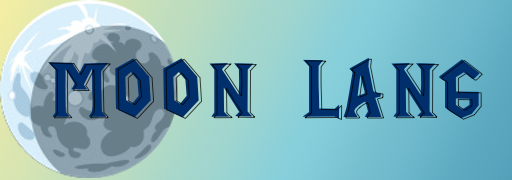moon-lang
 moon-lang copied to clipboard
moon-lang copied to clipboard
Custom scripting language Compiler and VM written in C++11.
Moon scripting language compiler and VM

Moon is a custom scripting language that borrows some of its syntax from
Lua and Rust.
This is mainly a toy/hobby project to learn more about compiler design, Virtual Machines and Interpreters.
The name is just a play on the meaning of Lua (Moon in Portuguese). I chose the name on purpose to leave it clear this is a lame rip-off on the syntax of the popular scripting language. This project is not affiliated to MoonScript.
Building
To build the project on Mac and Linux, use the provided Makefile. Before building, make sure you have:
- Flex version
2.6or newer installed. - Bison version
3.0.4or newer installed. - A C++11 compiler. GCC v5 or above is recommended for Linux and Clang v6 or newer for Mac OSX.
To install Bison and Flex on Mac OSX, brew is the tool of choice. If you experience problems with the system path, make sure to check out this thread.
On Linux, you can use apt or whichever is your package manager of choice.
You might need to download and build Bison yourself if a recent binary image is not available.
Building on Windows is currently not officially supported. The source code should be fully portable,
so all that should be required for a Windows build is to create a Visual Studio project. I was not able to
find a binary distribution or even compilable source for the required Bison & Flex versions for Windows,
so I have included the generated source files in the generated/local/ dir. You'll be able to build on Windows
without Bison & Flex, but you won't be able to generate new files if the parser or lexer are changed.
Gallery
Hello world in Moon Lang:
// Once
println("Hello world!");
// A few times
for i in 0..5 do
println(i, ": Hello world!");
end
Declaring variables:
let i = 42; // An integer number
let pi = 3.141592; // A floating-point number
let s = "hello"; // A string
let r = 0..10; // A range
let a = ["a", "b", "c"]; // An array of strings
User-defined structs and enums:
type Foo struct
int_member: int,
float_member: float,
str_member: str,
end
// Declaring an instance of a structure:
let foo = Foo{ 1, 2.2, "3" };
type Colors enum
Red,
Green,
Blue,
end
// Use enum constants:
let color = Colors.Blue;
// Type alias:
type Bar = Colors;
Recursive Fibonacci:
func fibonacci(n: int) -> int
if n <= 1 then
return n;
end
return fibonacci(n - 1) + fibonacci(n - 2);
end
let fib = fibonacci(15);
println("Fibonacci of 15 = ", fib);
Iterative Fibonacci:
func fibonacci(n: int) -> int
let a: int = 0;
let b: int = 1;
let c: int = 0;
if n == 0 then
return a;
end
let count = n + 1;
for i in 2..count do
c = a + b;
a = b;
b = c;
end
return b;
end
let fib = fibonacci(15);
println("Fibonacci of 15 = ", fib);
C++ interface:
// Minimal sample of how to run a Moon Lang script from C++
#include "compiler.hpp"
#include "vm.hpp"
int main()
{
moon::Compiler compiler; // Script parsing and bytecode output.
moon::VM vm; // Executes bytecode produced by a Moon Compiler.
try
{
compiler.parseScript(&vm, "my_script.ml");
compiler.compile(&vm);
vm.execute();
}
catch (const moon::BaseException & e)
{
// Handle a compilation error or a runtime-error.
// The exeption type will differ accordingly
// (CompilerException, RuntimeException, etc).
}
}
License
This project's source code is released under the MIT License.